Welcome to the internet portal of the United States Courts for the Ninth Circuit.
more >>
|
 |

|

|
First Ninth Circuit Conference Since 2019 Enlightens, Probes, Presents Special Guests
August 17, 2022
By William Cracraft
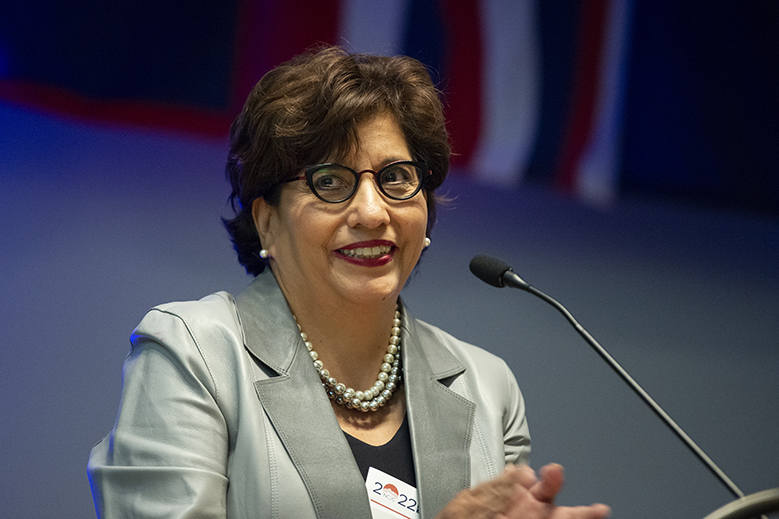
U.S Ninth Circuit Chief Judge Mary H. Murguia addresses attendees to open the 2022 Ninth Circuit Judicial Conference held in Big Sky, Mont., in July.

U.S Ninth Circuit Chief Judge Mary H. Murguia addresses attendees to open the 2022 Ninth Circuit Judicial Conference held in Big Sky, Mont., in July.
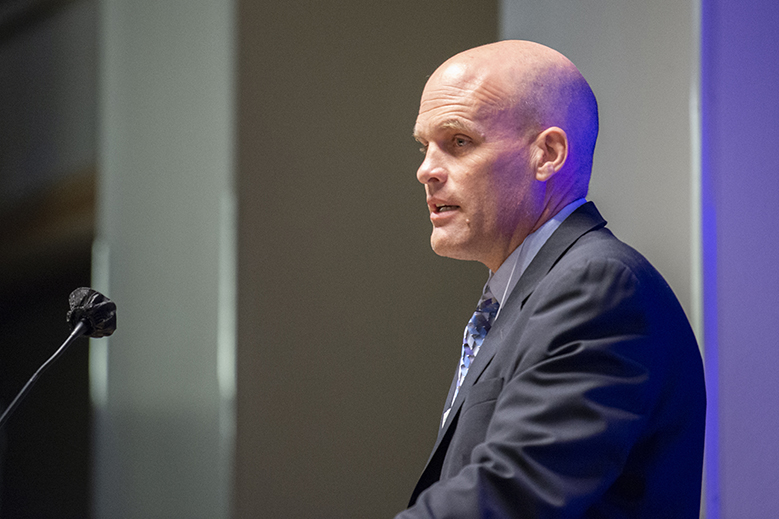
Conference chair U.S. Ninth Circuit Judge John B. Owens highlights upcoming events in his introductory remarks at the 2022 Ninth Circuit Judicial Conference.

Conference chair U.S. Ninth Circuit Judge John B. Owens highlights upcoming events in his introductory remarks at the 2022 Ninth Circuit Judicial Conference.
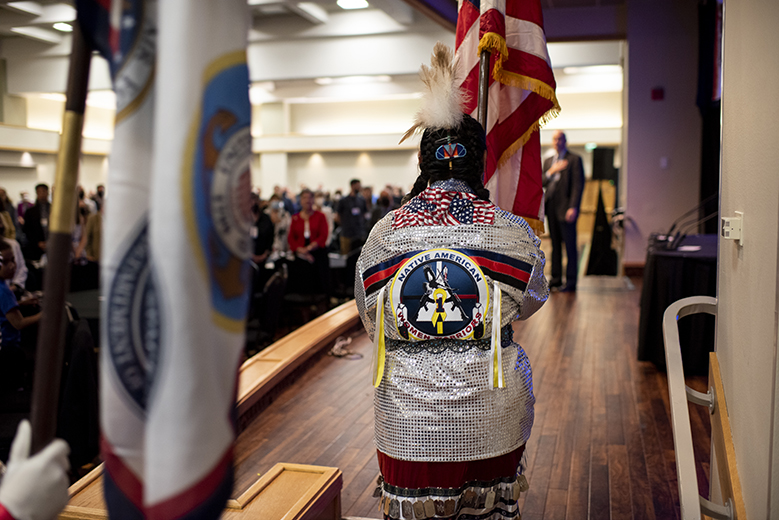
The colors were presented at the 2022 NCJC by the Native American Women Warriors, a group dedicated to surface recognition of women veterans, especially those of Native American descent.

The colors were presented at the 2022 NCJC by the Native American Women Warriors, a group dedicated to surface recognition of women veterans, especially those of Native American descent.
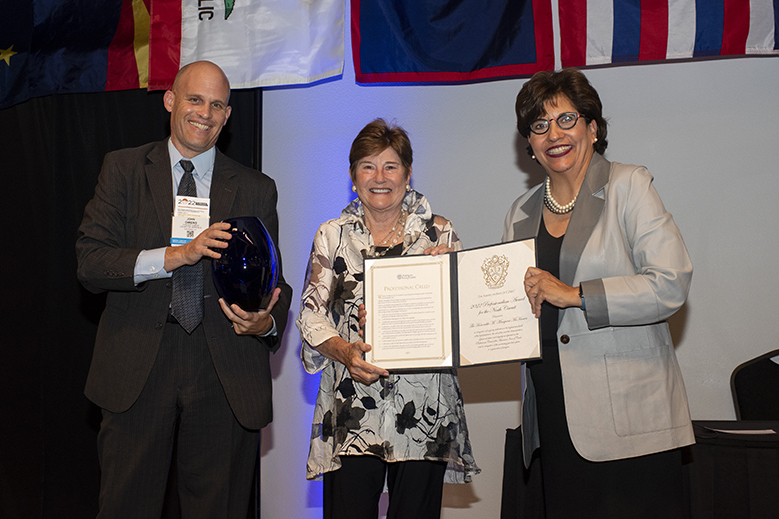
U.S. Ninth Circuit Judge M. Margaret McKeown (center) was presented with the prestigious 2022 American Inns of Court Professionalism Award for the Ninth Circuit by Chief Judge Mary H. Murguia and conference chair Judge John Owens.

U.S. Ninth Circuit Judge M. Margaret McKeown (center) was presented with the prestigious 2022 American Inns of Court Professionalism Award for the Ninth Circuit by Chief Judge Mary H. Murguia and conference chair Judge John Owens.
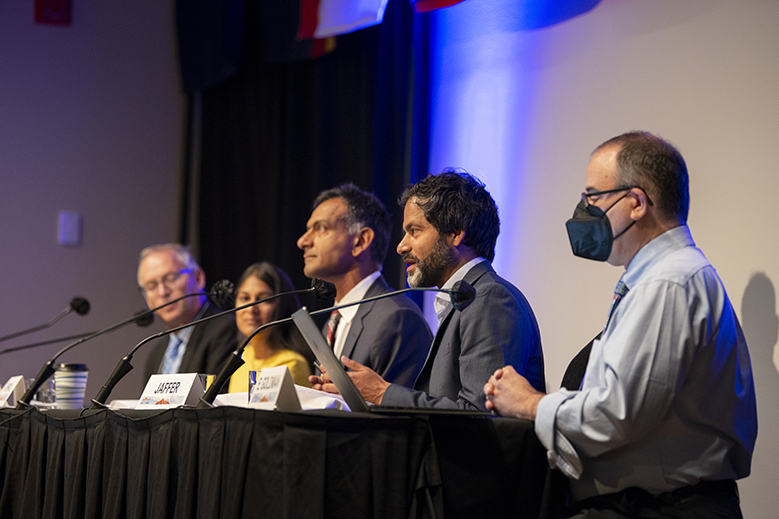
The panel session, ‘Social Media and Democracy,’ was held Thursday morning and included Richard L. Hasen, chancellor’s professor of law and political science, University of California, Irvine School of Law; Neema Singh Guliani, head of national security, democracy, and civil rights public policy, Americas, Twitter; Paul S. Grewal, chief legal officer, Coinbase; Jameel Jaffer, executive director, Knight First Amendment Institute, Columbia University; and Eric Goldman, associate dean for research and professor, Santa Clara University School of Law, co-director, High Tech Law Institute. Not pictured is moderator Mary-Rose Papandrea, Samuel Ashe Distinguished Professor of Constitutional Law, University of North Carolina School of Law, leader UNC’s Democracy Initiative.

The panel session, ‘Social Media and Democracy,’ was held Thursday morning and included Richard L. Hasen, chancellor’s professor of law and political science, University of California, Irvine School of Law; Neema Singh Guliani, head of national security, democracy, and civil rights public policy, Americas, Twitter; Paul S. Grewal, chief legal officer, Coinbase; Jameel Jaffer, executive director, Knight First Amendment Institute, Columbia University; and Eric Goldman, associate dean for research and professor, Santa Clara University School of Law, co-director, High Tech Law Institute. Not pictured is moderator Mary-Rose Papandrea, Samuel Ashe Distinguished Professor of Constitutional Law, University of North Carolina School of Law, leader UNC’s Democracy Initiative.
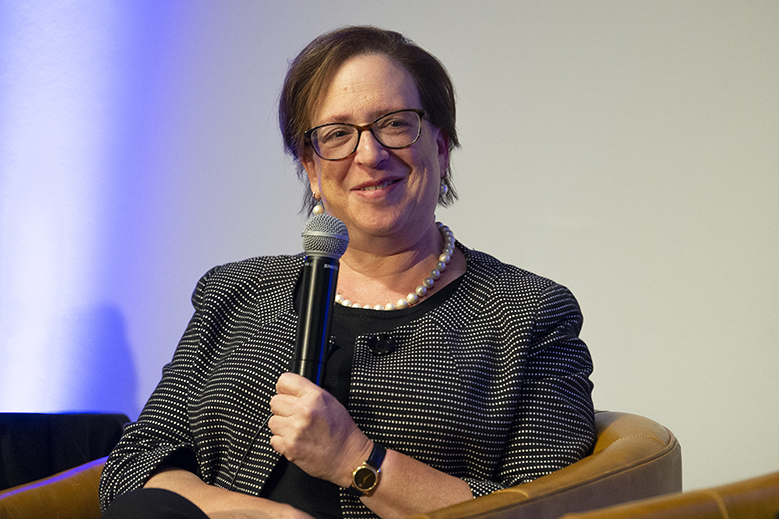
Special guest Associate Justice Elena Kagan, of the Supreme Court, spoke and answered questions at the fully-attended conference wrap up session, ‘Conversation with the Justice.’

Special guest Associate Justice Elena Kagan, of the Supreme Court, spoke and answered questions at the fully-attended conference wrap up session, ‘Conversation with the Justice.’
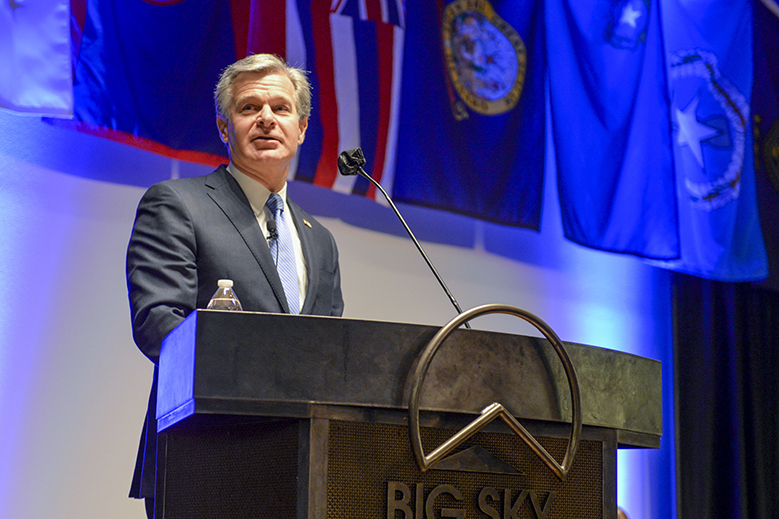
Special guest FBI Director Christopher J. Wray addresses a full house on the challenges and successes of the FBI and Justice Department in combating terrorism, computer hacks and more.

Special guest FBI Director Christopher J. Wray addresses a full house on the challenges and successes of the FBI and Justice Department in combating terrorism, computer hacks and more.
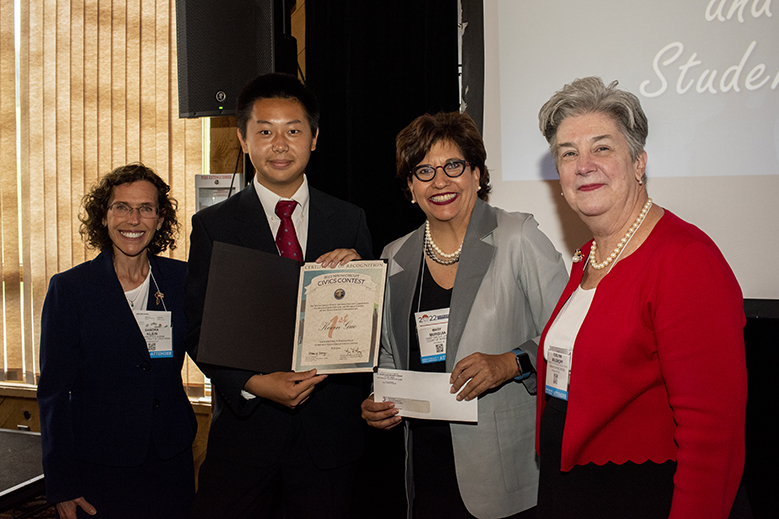
Special guest Director Roslynn R. Mauskopf (right), of the Administrative Office of the U.S. Courts, joins Chief Judge Mary H. Murguia (second from right) and Bankruptcy Judge Sandra R. Klein, in presenting a check and certificate to Kevin Guo, first-place essay winner of the 2022 Ninth Circuit Civics Contest.

Special guest Director Roslynn R. Mauskopf (right), of the Administrative Office of the U.S. Courts, joins Chief Judge Mary H. Murguia (second from right) and Bankruptcy Judge Sandra R. Klein, in presenting a check and certificate to Kevin Guo, first-place essay winner of the 2022 Ninth Circuit Civics Contest.
The first Ninth Circuit Judicial Conference in three years was held July 18-21 in Big Sky, Montana. The event brings together judges and lawyers from around the circuit to discuss current trends in litigation and court management and improve the administration of justice throughout the Ninth Circuit. The conference theme was “The Future of ‘Being Back’: Technology, Transparency and the Administration of Justice,” and special guests included the Honorable Elena Kagan, associate justice, United States Supreme Court; FBI Director Christopher Wray; and the Honorable Roslynn R. Mauskopf, director, Administrative Office of the U.S. Courts.
The conference opened with a greeting from Ninth Circuit Chief Judge Mary H. Murguia, and meetings began immediately afterward. Opening ceremonies were held in the afternoon, including presentation of the colors by the Native American Women Warriors, a group dedicated to surface recognition of women veterans, especially of Native American descent, and their contribution to the military. The group assists Native American women veterans with education, employment and counseling.
Chief Judge Murguia noted the Ninth Circuit’s tradition of excellent programs of interest to all conference attendees and that the conference aimed to “stimulate productive discussion for ways the Circuit can improve its administration of justice in light of lessons learned from having to weather the coronavirus pandemic.” The conference was assembled by Circuit Judge John B. Owens, conference chair, and District Judge Michael H. Simon, program chair. With two years to plan, programming was adjusted as new and timely topics emerged as others faded away.
Attended by 181 judges and 170 lawyers, the event included sessions on artificial intelligence in the law; ethics, conflicts and recusals; global internet takedown orders; virtual proceedings and cameras in the courtrooms; ethical and practical issues around sealed filings and social media and democracy.
On Wednesday, July 20, Director Wray spoke covering a range of topics of interest to judges and lawyers alike, including the ongoing threat to national security from cyberterrorism, the dangers of the dark web, the challenges of virtual currencies and encrypted data access. Director Wray noted the FBI has developed their own methods and tools to track and ameliorate these issues. He then answered a number of questions from the audience.
On the final day of the conference, Justice Kagan sat for a conversation with Chief Judge Mary H. Murguia, District Judge Michael H. Simon and Doreen Hartwell, chair of the Lawyer Representatives Coordinating Committee, addressing several topics, including how justices dealt with COVID-19 restrictions in order to continue their operations. One question she was asked concerned the current lack of public approval of the Supreme Court and what can be done to improve public confidence. Justice Kagan noted that was a tough question, but that overall, the answer is to act like a court.
She named three things that help a court maintain public trust: by adhering to precedent except when there is extraordinary justification for not doing so; by the consistent application of methodologies that constrain and discipline judges; and by deciding only the questions that are really before them and that need to be decided. ###
|










